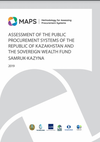Public Procurement in Kazakhstan
Reforming for Efficiency
Public procurement is crucial for delivering public services, whether in health, education, infrastructure or public safety. In Kazakhstan, public procurement accounts for 6.6% of GDP in Kazakhstan, which is relatively low compared to the OECD average, but it also represents 43% of government expenditures, which is above the OECD average. Kazakhstan is committed to improving its system to maximise its potential, and made significant changes to the public procurement law in recent years. SOEs (the “quasi-state sector”) account for about 30-40% of Kazakhstan’s GDP. While there are some differences in the legal rules, SOEs overall face challenges similar to those of the central public procurement of the government of Kazakhstan.
This review focuses on six topics, which all contribute to the functioning of a public procurement system:
- the legal and institutional framework,
- the contract-awarding process, reviewing procedures and increasing administrative efficiency,
- the e-procurement system, looking at ways to enlarge the scope and improve its functioning,
- risk management and accountability, analysing internal control procedures and integrity standards in the procurement profession,
- strategic procurement and capacity, exploring ways to go beyond procurement as an administrative function, and
- state-owned enterprises (SOEs), comparing their challenges with those of state public procurement.
Fast Facts
 |
Countries: Kazakhstan |
 |
Timeframe: November 2017 – December 2019 |
 |
Counterparts:
|
 |
Areas of focus: |
List of Deliverables
- Public procurement review, including thorough updated version
- Launch seminar with policy makers
- Two technical workshops with procurers
Timeline
- November 2017: Sharing a first questionnaire to collect background information
- April 2018: Kick-off meeting, Nur-Sultan, Kazakhstan
- May / June 2018: Fact finding mission, Nur-Sultan, Kazakhstan
- July 2018: First draft of the review
- September 2018: Discussion of first draft and recommendations
- October 2018: Discussion of the first draft with the OECD’s Working Party of the Leading Practitioners on Public Procurement, peer review
- April 2019: Second, substantially updated draft of the review, following major changes introduced to the law and made effective in January 2019
- September 2019: Launch: discussion of findings with policy makers; two technical two days’ workshop each, delivered by the OECD Public Procurement team with peer expert participation from Lithuania’s Public Procurement Office to Kazakhstani practitioners, in Nur-Sultan and Almaty, Kazakhstan
- December 2019: Delivery of updated, final report in English and Russian
Content of the project
Kazakhstan undertook numerous legal reforms of the public procurement system in recent years. While this reflects the commitment to modernise, it also creates difficulties for public procurers who have to adapt to the new laws. Streamlining the system would allow Kazakhstan to fully exploit the potential of procurement and achieve greater value for money. An excessive use of direct procurement, a high number of failed bids, as well as a lack of integration of the market conditions are among the obstacles to a more efficient system.
The national e-procurement system has been expanded, and now almost all procedures are conducted electronically. This coverage of 6.1 million contracts is exemplary as it represents a large share of the procurement system. Aside from the laudable improvements in terms of process management, more could be done to better collect data and aggregate statistics. The collected data could also be used to a greater extent for evaluation and performance management.
While integrity measures exist, Kazakhstan has not yet developed a procurement-specific strategy. The country has made efforts to broaden its complaints management system, but it could increase the opportunities for direct involvement of relevant external stakeholders and address the issue of “professional complainers” who slow down the mechanism.
Public procurement in Kazakhstan is still predominantly perceived as an administrative rather than a strategic function. Changing this perception could allow for further development of strategic considerations, which requires an adequately skilled public procurement workforce. However, public procurement is currently not recognised as a profession, and training for procurers is mainly focused on law and compliance.
Many issues that are prevalent in the public procurement system of Kazakhstan also apply to the procurement of state-owned enterprises (SOEs). These include extensive use of single source procurement and low level of competition in procurement procedures. Previously, there were important differences in the legal and regulatory frameworks of SOEs and the government procurement sector. The most recent reform eliminated some discrepancies, but potential for further alignment remains.


